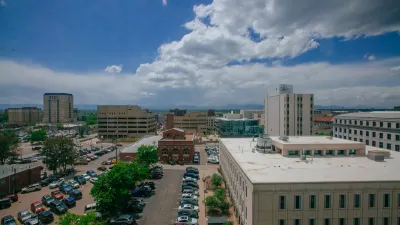Proponents of the resolution say the city’s parking mandates encourage drunk driving and drive up construction costs for small businesses.

Austin could remove parking requirements for bars, taking a small step toward abolishing parking mandates citywide, reports James Rambin in Towers. “A resolution amending city code to eliminate non-accessible parking requirements for cocktail lounge land uses is on the agenda for this Thursday’s council meeting, introduced by CM Velásquez and co-sponsored by a downright bipartisan coalition of CMs Vela, Kelly, and Mayor Kirk Watson.”
Critics of parking requirements for bars argue the rules “effectively subsidize drunk driving” and encourage people to drive to bars. Additionally, the cost of building parking spots can be prohibitive for small bar owners. “It’s a small tweak that could subtly become one of the most broadly transformative land use changes Austin’s seen in years — but due to the wide-ranging effect of removing these parking minimums, we can already imagine the opposition.”
For Rambin, creating more opportunities for small neighborhood bars means more Austinites can “drink and socialize within walking distance of their homes, removing cars from the equation entirely.” As Rambin points out, “that ought to be a policy goal in a state where nearly 30 percent of traffic fatalities involve impairment from alcohol.”
FULL STORY: Raise a Glass to Austin’s Planned Abolition of Bar Parking Mandates

Planetizen Federal Action Tracker
A weekly monitor of how Trump’s orders and actions are impacting planners and planning in America.

Restaurant Patios Were a Pandemic Win — Why Were They so Hard to Keep?
Social distancing requirements and changes in travel patterns prompted cities to pilot new uses for street and sidewalk space. Then it got complicated.

Map: Where Senate Republicans Want to Sell Your Public Lands
For public land advocates, the Senate Republicans’ proposal to sell millions of acres of public land in the West is “the biggest fight of their careers.”

Maui's Vacation Rental Debate Turns Ugly
Verbal attacks, misinformation campaigns and fistfights plague a high-stakes debate to convert thousands of vacation rentals into long-term housing.

San Francisco Suspends Traffic Calming Amidst Record Deaths
Citing “a challenging fiscal landscape,” the city will cease the program on the heels of 42 traffic deaths, including 24 pedestrians.

California Homeless Arrests, Citations Spike After Ruling
An investigation reveals that anti-homeless actions increased up to 500% after Grants Pass v. Johnson — even in cities claiming no policy change.
Urban Design for Planners 1: Software Tools
This six-course series explores essential urban design concepts using open source software and equips planners with the tools they need to participate fully in the urban design process.
Planning for Universal Design
Learn the tools for implementing Universal Design in planning regulations.
Heyer Gruel & Associates PA
JM Goldson LLC
Custer County Colorado
City of Camden Redevelopment Agency
City of Astoria
Transportation Research & Education Center (TREC) at Portland State University
Camden Redevelopment Agency
City of Claremont
Municipality of Princeton (NJ)





























